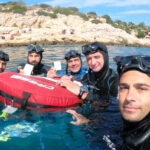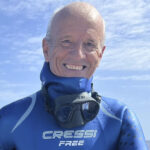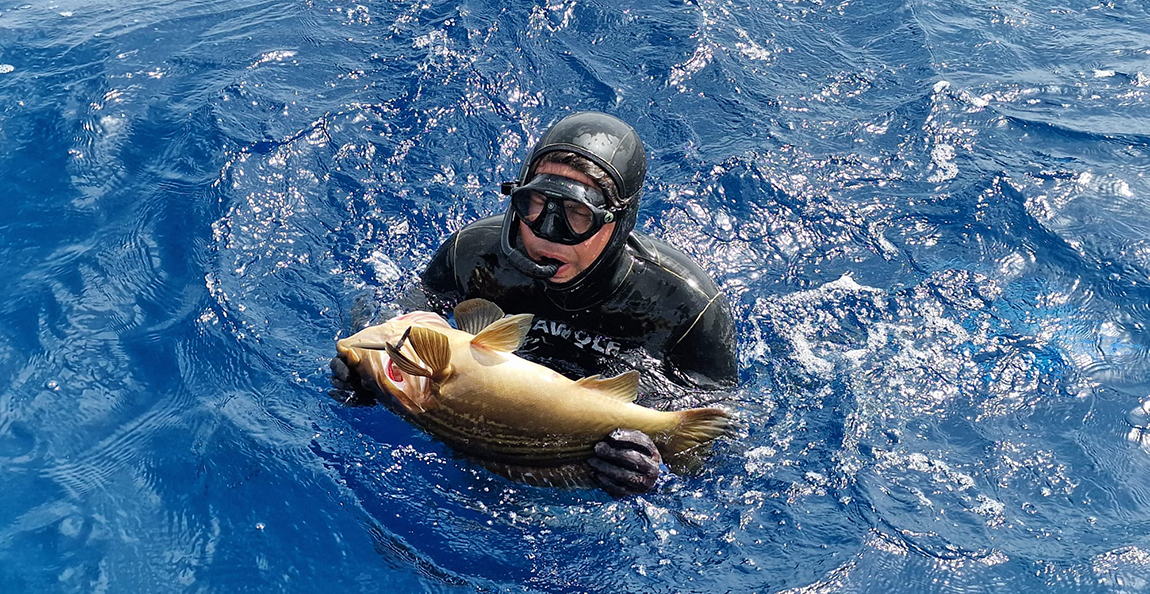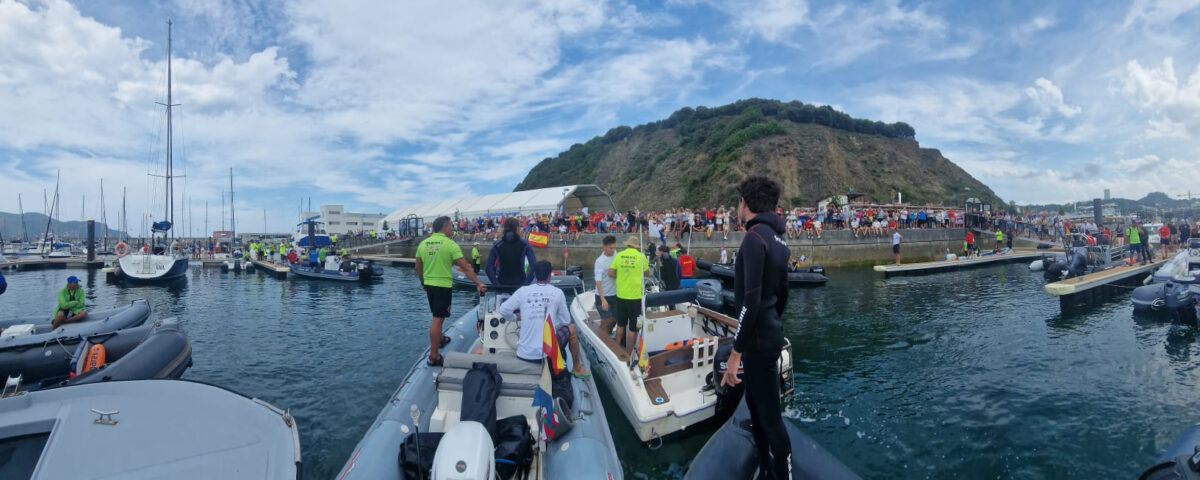The Puretti’s Corner

Greece: Hellas Freediving
28 April 2024
Up Close: Riccardo Molteni
30 April 2024It's the first in a series of articles written by the Vice World Champion and flagship athlete of our national team. In "his corner," he will tell us about catches, places, and episodes that have happened to him over many years of competitions and sea adventures. Today he talks about the "behind the scenes of a trip"
Luigi Puretti
"We are in the midst of organizing the Euro-African Championship, which takes place in Turkey, in the Sea of Marmara, this month of May, just before the Absolute Championship. And this is something new. In fact, the last two competitions were held in the autumn. It's always a complex phase, not easy, for a sport like ours, which, let's not forget, is amateur. We're certainly not footballers. They have everything organized to perfection; they get off the plane and only have to think about the game. For us, it's different, complicated, sometimes adventurous. And this despite having one of the most structured federations,
which covers all our travel, food, and lodging expenses. Obviously, the budget is not unlimited, and since everyone can prepare for as long as they want, we need to optimize resources. Especially considering that, with the advent of women, we have about fifteen people per trip, including athletes, boatmen, assistants, coaches, and companions. Not a few, then. Some athletes may decide to leave before the official preparation begins, independently, and then meet up with the rest of the group.
"It must be said that the last two trips have been really challenging, I refer to the World Championship in Spain, in Laredo, and the Euro-African in Tunisia, in Bizerte. Truly distant places that required a long journey. Especially since myself and some of my teammates prefer to bring our own boat, for two reasons. First, because renting one locally for a long period becomes quite expensive, and second, because I feel more comfortable competing with my own vessel, which I know is perfectly reliable, with an efficient engine, and, above all, because I have my electronic equipment available, which is irreplaceable and fundamental for me.
"As I was saying, these have been very challenging trips. The last one, to Laredo, required over 50 hours of travel, although it was smooth. I left with my car from Puglia towards Civitavecchia, it's 750 kilometers; from there, my assistant, Alfonso Cubicciotto, and I boarded for Barcelona, which was another 24 hours of travel. Finally, 700 kilometers to reach Laredo. So, 1500 kilometers by car, plus 24 hours by ferry, but under favorable conditions, with quiet roads and good services. We crossed the Greenwich Meridian, took turns driving, and everything went smoothly. Also thanks to the bond I have with Alfonso. And this is crucial. The assistant must obviously be a strong fisherman, a good preparer, but above all, they must be someone you can build a good relationship with. You need to get along, share the positive moments, and overcome the negative ones together. Otherwise, the journey would become unbearable, and after three days, the "couple" would break up. I like to emphasize this concept because it's crucial. During the last trip, to Spain, with Alfonso and Andrea Fazzolari, there was never the slightest quarrel, the slightest argument. We worked in harmony, and no one ever backed down, even when we were tired, or when we couldn't find fish. And this is crucial for me, as is obviously the role of the boatman during the competition.
"The trip to Tunisia was shorter, but more troubled. The transfer by ship was not very pleasant, and once we landed in Tunis, we drove about 150 kilometers to Bizerte. And there we went through a lot. When we disembarked from the ship, we underwent ten thousand checks; they literally dismantled our car and boat, requiring a bunch of permits, for Covid, for the trailer, for the engine, for the watercraft, for insurance. And everything had its price. Long story short, we landed in the morning and managed to leave the port only in the evening. And, as if that wasn't enough, during the journey, I damaged the keel of the boat; a roller on the trailer had cracked it. Result: we spent the whole night stripping the keel, and the next morning, we went around Bizerte looking for fiberglass to repair it. “You can imagine our emotional state. We were in a place we didn't know, and we had to fix the damage, moreover with strange characters circling around us while we worked,
probably to steal our boat. Not only that. We had to go to the Maritime Police to declare everything of value on board, the electronic equipment, and there we wasted more time.
"In short, only after 4 days, in the afternoon, could I finally go out to sea; it was late, and I mainly wanted to try to relax and leave behind the problems of the past few days. I was in the water for barely two hours, but it served me psychologically. This is to reaffirm what was said before, namely that we are not footballers and it is therefore important to be able to cope, to have the right mental predisposition to overcome unforeseen events without affecting our performance in the competition.
“Then there is the aspect related to adapting to local customs and habits. And it is known that for us Italians, it is not easy to get used to their cuisine, even though in the resort in Tunisia, some of the dishes were perhaps not excellent, but still acceptable. So, in this respect, it went better than expected. On the other hand, the water from the sink, for brushing our teeth and that of the shower, created some problems for us, and we only realized it after a few days. Indeed, we all suffered from diarrhea caused precisely by the water.
“In Spain, even though it may seem strange, the resort cuisine was really terrible. Fortunately, we had taken the habit, in the morning, at the port, before going out to sea, to stop at a store to buy some bread and excellent ham, Jamon serrano, with which we managed to get through the day. Of course, we had a lot of ham, but it partially solved the problem for us.
“As for the May trip to Turkey, it promises to be not easy. I will depart with the boat from Brindisi to disembark in Igoumenitsa, Greece; from there, we have to decide whether to face a thousand kilometers to the Sea of Marmara, on this archipelago of islands where the Euro-African will take place, or cross Greece, continue by ferry to Istanbul and travel another stretch of about 200 kilometers.
“It is a not very touristy place, quite peripheral, which is why everything needs to be planned in detail. For example, we are checking if there are gas stations because every day we need to refuel the boat, and the marinas, being very small, do not have pumps for refueling. Then there is the issue related to accommodation. Ideally, it would be to find it at the marina to avoid maybe driving 30 or 40 kilometers by car every day, but we still need to understand if there are accommodations suitable for hosting the whole team. We are working on it, and I am sure that in the end, all the pieces will fall into place. I trust in our experience and in that of the federation to be able to organize this trip as best as possible, which will not be easy even in the water. These are indeed unknown places, we still need to understand which technique to adopt, which strategy, which fish will be important to aim for victory. But that's another story.
"Goodbye guys, until next time and keep following us!"



